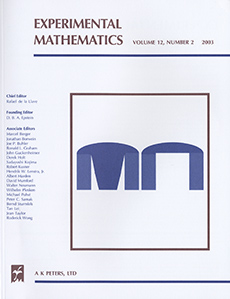Abstract
Let G be a simple algebraic group and P a parabolic subgroup of G. The group P acts on the Lie algebra $\mathfrak p_u$ of its unipotent radical $ P_u$ via the adjoint action. The modality of this action, mod ($P : \mathfrak p_u)$, is the maximal number of parameters upon which a family of P-orbits on $\mathfrak p_u$ depends. More generally, we also consider the modality of the action of P on an invariant subspace $\mathfrak n$ of $\mathfrak p_u$, that is mod ($P :\mathfrak n)$. In this note we describe an algorithmic procedure, called MOP, which allows one to determine upper bounds for mod ($P :\mathfrak n)$.
The classification of the parabolic subgroups P of exceptional groups with a finite number of orbits on $\mathfrak p_u$ was achieved with the aid of MOP. We describe the results of this classification in detail in this paper. In view of the results from Hille and Röhrle (1999), this completes the classification of parabolic subgroups of all reductive algebraic groups with this finiteness property.
Besides this result we present other applications of MOP, and illustrate an example.
Citation
Ulf Jürgens. Gerhard Röhrle. "MOP---Algorithmic Modality Analysis for Parabolic Group Actions." Experiment. Math. 11 (1) 57 - 67, 2002.
Information




